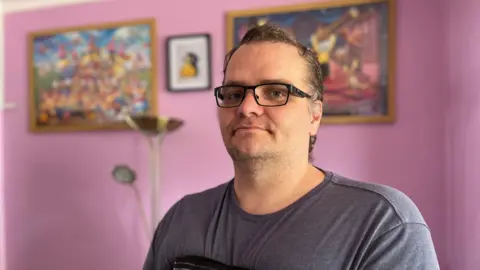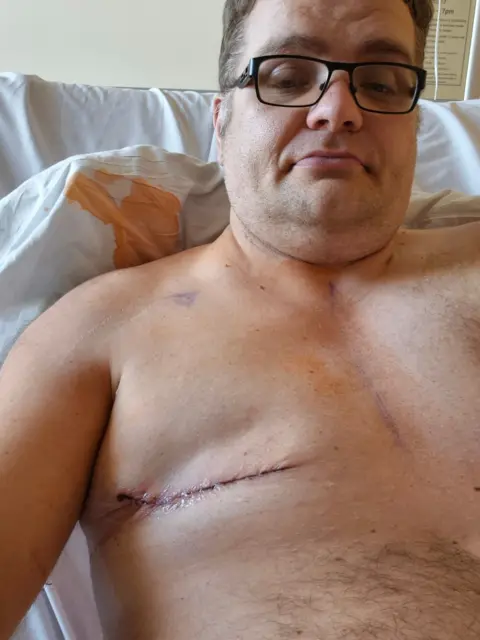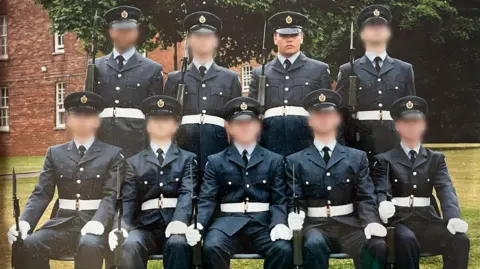'Having breast cancer makes me feel an imposter'
 BBC
BBCOn his most recent visit to a hospital breast clinic, Neil Ferriby noticed the surprise of the female patients who filled the waiting room when he was called forward.
It is moments like those that have contributed to the 42-year-old feeling "almost an imposter" since he was diagnosed with male breast cancer.
"The room was noisy and then, as soon as they said 'Neil', you could hear a pin drop. They were all staring at me," he said.
"I guess they don't expect men of my age to get breast cancer."
The former RAF mechanical transport driver from east Hull has an elasticated support strapped around his chest, helping his recovery from surgery to remove 13 lymph nodes and three tumours.
Warning: This story includes a post-surgery picture
Mr Ferriby said he had first noticed a lump and a burning sensation around his nipple in January, but dismissed them as harmless.
"In my head, it was kind of like, it's only females what get breast cancer, or males in their 60s plus," he said.
Four weeks passed before his family and friends persuaded him to see his GP. He was referred to Castle Hill Hospital in East Yorkshire for a mammogram and ultrasound.
In March, a biopsy found cancerous cells and, after surgery in April, he started chemotherapy this week.
Mr Ferriby completed a tour of Iraq during his 12 years of RAF service and said the experience had helped him cope with the diagnosis.
"It's gone back to the military mindset that even if you're injured you still fight, and I'm here to fight, not to let cancer take me," he said.
 Neil Ferriby
Neil FerribyThe charity Breast Cancer Now said approximately 400 men were diagnosed with breast cancer each year in the UK, compared with about 55,000 women.
Of those men, only about 100 are under 60.
Katy Goford, the charity's clinical nurse specialist, said all men had breast tissue and should be as aware of changes as women.
"It's the same message we would put to women - that you need to be aware of what your chest looks and feels like normally," she said.
"We'd encourage everybody to touch, to look and to check your chest and to report any changes that you see to your GP."
The charity, which offers a helpline and a buddy service to match men with other male breast cancer patients, said being diagnosed with breast cancer could be "very isolating" for men.
'Guinea pig'
Mr Ferriby said he had become aware of how unusual his case was when the number of people coming into his appointments increased from a doctor and a nurse to "coachloads" of people.
But, keen to raise awareness of how breast cancer presents in men, he said he was happy staff and students were able to learn from him.
"I don't mind being a guinea pig for the NHS," he said.
Mr Ferriby said he had found his local breast cancer support charity supportive, despite having reservations initially.
He said: "It's called HER Breast Friends, so I emailed 'Do you actually deal with males?'
"But the email I got back was so lovely, they said 'Yes, and come to our pamper day'."
 Neil Ferriby
Neil FerribyAccording to the NHS website, breast cancer symptoms can include:
- a lump, or swelling in your breast, chest or armpit
- a change in the skin of your breast, such as dimpling or redness
- a change in size or shape of one or both breasts
- nipple discharge (if you are not pregnant or breastfeeding), which may have blood in it
- a change in the shape or look of your nipple, such as it turning inwards or a rash on it
- pain in your breast or armpit which does not go away
'Don't leave it four weeks'
Mr Ferriby said, after completing his chemotherapy, he would need radiotherapy and would take the drug Tamoxifen for 10 years.
He is raising funds for the charity Macmillan, whose nurses are helping him through his cancer journey.
Mr Ferriby said he wanted to make men more aware they could contract breast cancer.
"Everything that you see - posters, TV adverts - it's mainly all being geared towards women," he said.
"If there's any men out there, especially my age or younger, and they find something in the chest wall that doesn't feel right, maybe don't leave it four weeks to go to the GP like I did."
- If you have been affected by the issues raised in this article, you can visit the BBC Action Line for information and support
Listen to highlights from Hull and East Yorkshire on BBC Sounds, watch the latest episode of Look North or tell us about a story you think we should be covering here.
